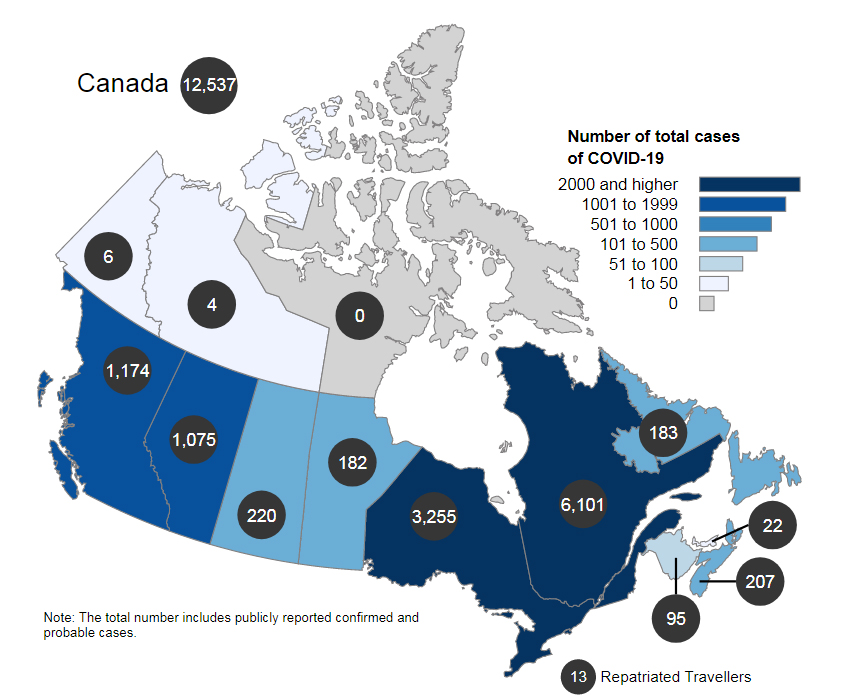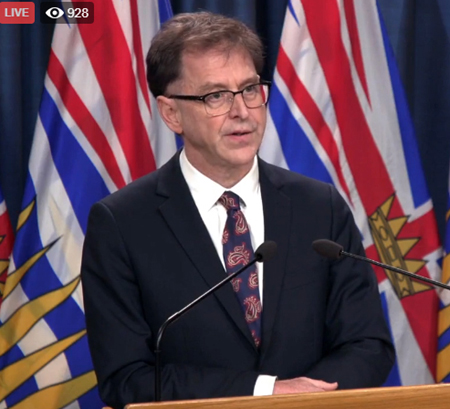
Friday April 3, 2020 ~ GLOBAL & BC
by Mary Brooke, B.Sc. ~ West Shore Voice News
The spread of COVID-19 viral infection continues around the world. The new coronavirus was first seen in China in December 2019.
The number of confirmed cases grew steadily and the pandemic was finally declared by March 11 after some careful politically by the World Health Organization around the mighty Chinese government that saw the initial outbreak in their country (with Wuhan in Hubei Province as the epicenter).
The World Health Organization (WHO) shows in their April 3, 2020 Situation Report #74 that to date there have been 972,640 confirmed cases of COVID-19 globally, which has led to 50,322 deaths. Of the worldwide COVID-19 death tally, 5,600 have been in the Americas (USA, Canada, Mexico and South America).

In Europe, the highest number of cases and deaths is still seen in Italy (115,242 cases, 13,917 deaths), followed by Spain (110,238 cases, 10,003 deaths), Germany (79,696 cases, 1,107 deaths) and France (58,327 cases and 4,490 deaths). Significant containment in Israel has seen just 6,211 cases and only eight deaths; similarly Norway has confirmed 4,935 cases and reported only 10 deaths.
In Canada today April 3, the Public Health Agency of Canada reports 12,537 confirmed cases of COVID-19, with 1,174 of those in BC as reported by BC Health.

It should be noted that confirmed case counts in Canada only represent data that is significantly influenced by each province’s strategy for testing for the presence of the COVID-19 virus. It is widely accepted among health professionals that many people acquire the viral infection but proceed through the course of the illness with mild to no symptoms; those cases are not included in “number of confirmed cases”.
The WHO commentary in today’s report talks about “supporting and protecting older people” as “everyone’s business”. WHO says that although all age groups are at risk of contracting COVID-19, older people face significant risk of developing severe illness and that everyone should take part in preventing spread of the viral disease.
“The majority of those who are infected with COVID-19 have a self-limiting infection and do recover. However, we know that a minority go on to suffer more severe disease, with 10% of cases requiring intensive care unit admission,” it was stated by Dr Hans Henri P. Kluge, WHO Regional Director for Europe, in a report on April 2.

For attention globally, WHO says that ports, airports and ground crossings require careful monitoring. WHO has produced two online interactive courses to provide guidance for the management of ill travellers and for managing COVID-19 cases or outbreaks on board ships.
WHO is also calling for a stronger whole-of-society approach, in the South-East Asian Region in particular.

Today BC Health Minister Adrian Dix called on the Canadian government to more strictly enforce the boarding of planes by Canadians returning to Canada (and that anyone with symptoms not be allowed to return to Canada until they are well).
Dix also asked for better delivery of health orders upon arrival by travellers back in Canada, in that the federal Quarantine Act does require all returning travellers to self-isolate for 14 days immediately upon arrival back in Canada (without stopping at the store for groceries or other items on the way home).


